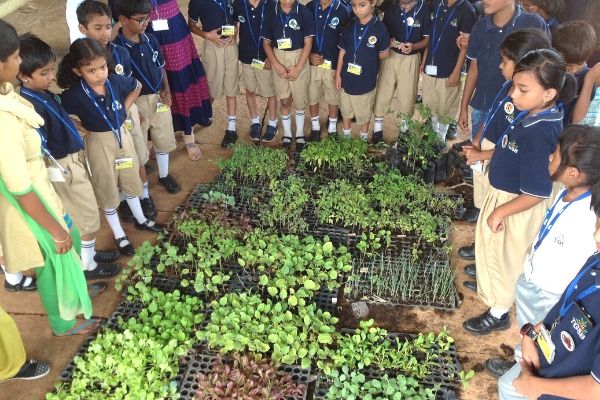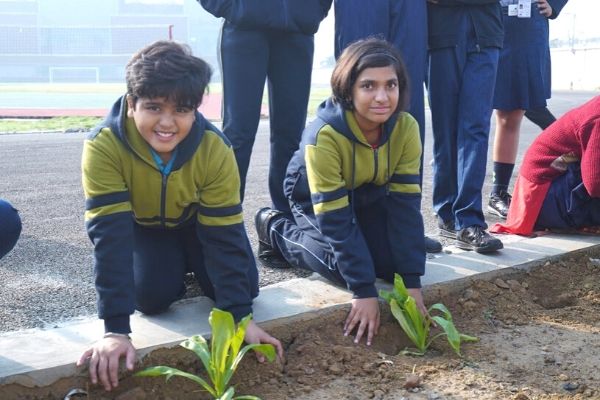Environment Day: “Creating a green environment helps shape sensible human beings”
World Environment Day is celebrated every year on June 5 to focus their efforts on a pressing environmental issue. This year the theme as declared by the United Nations is “Celebrating Biodiversity” – a concern that is both urgent and existential.
 “Global environmental issues urgently require a shift in our lifestyles and a transformation in the way we think and act. To achieve this change, we need new skills, values and attitudes that lead to more sustainable societies. Education systems must respond to this pressing need by defining relevant learning objectives and learning contents, introducing pedagogies that empower learners, and urging their institutions to include sustainability principles in their management structures,” says Usha Iyer, principal, The Green School Bangalore.
“Global environmental issues urgently require a shift in our lifestyles and a transformation in the way we think and act. To achieve this change, we need new skills, values and attitudes that lead to more sustainable societies. Education systems must respond to this pressing need by defining relevant learning objectives and learning contents, introducing pedagogies that empower learners, and urging their institutions to include sustainability principles in their management structures,” says Usha Iyer, principal, The Green School Bangalore.
Established with the vision of creating green leaders, The Green School Bangalore (TGSB) is the only green school in Varthur-Whitefield that focuses on inculcating environment awareness in students and staff with programmes and resources to promote a healthy lifestyle and the 3Rs: reducing, reusing, and recycling. “A source of green curriculum, TGSB is dedicated, to the ‘implementation of environmentally sustainable and energy-efficient systems and practices in K-12 schools’. It’s a zero-waste, zero energy, and a zero-carbon school where students work in organic farms and composite the waste” adds Iyer.
TGSB’s energy-efficient building conserves energy from a lighting system with sensors that allow for maximising the use of natural light. The entire school campus runs on solar energy as part of its carbon emissions reduction strategy, and planting, sowing, growing, harvesting and careful use of pesticides are a part of the school curriculum.
Besides, students are provided the opportunity to use natural products in culinary projects such as jam and pickle-making sessions. Students also get the outdoor gardens started, test the soil and sets up management and harvest plans for the next year’s class. The students are encouraged to practise what they learn by creating their own growing and farm spaces.

The Green School Bangalore students taking part in an environmental activity
Shiv Nadar School, an environmentally aware and conscious school follows all six sections of the Green School Program Audit – air, energy, food, land, water, waste in all it’s three campuses in Noida, Faridabad and Gurugram. This has “helped students to integrate elements of holistic environment education and relate it with the most challenging crisis of our time: climate change,” said the Environment Club Coordinator of the school. The school also put up solar panels on school gates to take down electricity usage in the school. On the ocassion of Environment Day, the coordination says that the holiday engagement shared with the students’ parents focuses on building environmental ethics in their children.

Shiv Nadar School students taking part in gardening before lockdown
Sustainable development certification programme
 Ecoschools is an international sustainable development certification programme for schools by the Foundation for Environmental Education (FEE) that was developed as a response to some of the needs identified at the UN Conference on Environment and Development in 1992. “Presently being implemented in over 68 countries, the programme was started in India by the Centre for Environment Education (CEE) in 2015. A total of 74 schools from all over India and 59,000 schools globally are part of this programme,” says Khushbu Shah, Ecoschools Coordinator, Centre for Environment Education, Ahmedabad, Gujarat on the occasion of Environment Day.
Ecoschools is an international sustainable development certification programme for schools by the Foundation for Environmental Education (FEE) that was developed as a response to some of the needs identified at the UN Conference on Environment and Development in 1992. “Presently being implemented in over 68 countries, the programme was started in India by the Centre for Environment Education (CEE) in 2015. A total of 74 schools from all over India and 59,000 schools globally are part of this programme,” says Khushbu Shah, Ecoschools Coordinator, Centre for Environment Education, Ahmedabad, Gujarat on the occasion of Environment Day.
 Radhey Shyam Pandey, principal of Nand Vidya Niketan, Jamnagar, Gujarat, which is part of Ecoschools programme says the school has set-up a seven-step methodology to improve the schools environment. The school constituted a separate dedicated Eco committee (Core Committee and Executive Committee) of teachers and students to plan and execute the environment-friendly ideas based on sustainability across their 3000 plus students, their parents and the local community. These include:
Radhey Shyam Pandey, principal of Nand Vidya Niketan, Jamnagar, Gujarat, which is part of Ecoschools programme says the school has set-up a seven-step methodology to improve the schools environment. The school constituted a separate dedicated Eco committee (Core Committee and Executive Committee) of teachers and students to plan and execute the environment-friendly ideas based on sustainability across their 3000 plus students, their parents and the local community. These include:
- Waste management at school and at home
- Water conservation awareness drives
- Creating school a ‘polythene-free zone’
- ‘Say no to single-use plastics’ campaign
- Plantation drive in the school campus and surrounding residential area.
- Development of medicinal plant garden with the help of Ayurvedic University, Jamnagar
- Development of vegetable garden at school
- Organising various field trips and visits to flower shows
- Creating awareness among the students and community through various role plays, skits, dances and speeches during school assembly and making it live on their various social media platforms
Being eco-friendly despite the ongoing covid-19 crisis
Ecoschools organised an online campaign called Ecoshools Warriors@home, where the students and parents shared a photograph or video related to the theme of World Environment Day – Biodiversity to spread the awareness among society.
Ecoschools also organised a snake awareness webinar for students and teachers on general information about snake, snake diversity, venomous and non-venomous precautions to avoid snake bite, treatment, myths and facts and conservation. These programmes have helped students and to stay positive mentally.
Meanwhile, during the lockdown, The Green School, Bangalore has been redesigning its lesson plans and realigning its resources and practices with the world of virtual learning and found new ways to keep the connection with their students. The teachers serve alternately as a student-squabble mediator, supportive listener and all-around problem fixer. All the efforts from their side ensure the students cope up emotionally with the remote learning practices.
Creating a healthy and sustainable environment helps in the development of children
“Children are born with natural curiosity as teachers, parents and society we only need to give them an ideal environment to grow and learn. The credit of one’s personality traits goes to genetics by 40 percent and to the environment by 60 percent. Hence, creating a green and healthy environment can definitely help shape children into great and sensible human beings,” says Pandey.
Concludes Iyer, “Skills such as observation, recording of hands-on research, and report writing are ways in which the Green Curriculum helps develop cognitive areas of learning.”
Sukanya Nandy
















Add comment